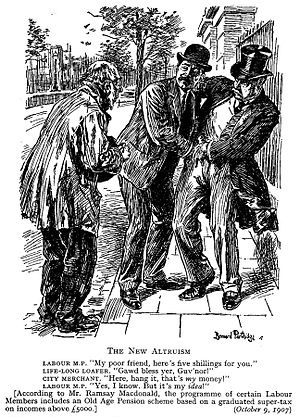Libertarians are inconsistent if they consider taxes immoral, but not wage labour and rent.
A frequent and much beloved (Right)-Libertarian talking point is on how taxes are not voluntary and that they are claimed by the state at the end of a gun barrel. “Taxes are theft”, “Taxes are violence” blah blah blah. We’ve all heard the spiel I’m sure. But I doubt how many have realized that such an argument is not really consistent with the logic libertarians ((I’ll avoid using (right) for brevity. Let’s just assume it’s implied whenever I say “libertarian” in this post.)) apply in regards to voluntary contracts and choice.
You see, a common aspect of most strains of libertarianism is that any choice made voluntarily – by which they mean, in the absence of active coercion – is morally acceptable for both parties. Thus a person choosing to work for a wage, has made a conscious decision to get in this position, because it increases his marginal utility. In the same vein, a person choosing to work in a sweatshop have made a decision which makes their life better off than before, so the sweatshop practice itself is obviously moral. A female being sexually harassed by her boss, but nevertheless staying in the job, is a voluntary choice which naturally means that the sexual attention she’s receiving does not constitute “harassment”. Naturally it follows that if people do not want to end up in this situations, they always have the choice of not taking those particular jobs.
So, in this context, aren’t taxes voluntary just as well? Consider that when you sign up for a job, you agree to a contract that states that a part of your wage will go to the state. You are volunteering to a contract that stipulates taxes. If you do not like the contract, you always have the choice of not working at all. This is a valid choice, as much as it is for the sweatshop worker, is it not? You weight your options and choose the one more beneficial to you.
Most likely libertarians will mention at this point that even those opening their own business have to pay taxes, even though they have no contract with the state. But that would also be false. They do have such a contract with the state. The contract that leases the land they live on, for it is in the very end, the property of the state. You can’t own any land, unless somewhere in the history of that land, there is a contract between state and the first owner. And that contract, had stipulations for taxes. The taxes of the business owner thus become analogous to the rent of a land owner, and much like the contract with a land owner can have stipulations that you can accept or deny, so does the contract with the state. In this case being that you have to give an amount of your income to the state in the form of income tax, and all contracts with your employees must stipulate income tax as well. If you choose to enter this voluntary contract, then naturally you must think it acceptable. Surely if the land owner was simply a private person, requiring rent from you and everyone you employ, you would have the same amount of choice, no?
It is the case then, that if you don’t like the terms of such contracts, you are of course free not to work at all. Nobody is forcing you to make such a choice. But if you do make it, then it’s under our own volition, is it not?
I can foresee at this point the enraged flames that will start bursting my way. Most likely I will be informed that the choice is an illusion, since the state has artificially and violently limited the options to either paying income tax, or not making money at all. And I will admit, this is a very compelling argument indeed.
Which is why I will have to pull the “switch” to my “bait” now.
You see, the argument that will be made to point out that the choice between “work with taxation or no work” is an artificial one, is the same one I will use myself to point that “work for a boss or don’t work” is an artificial choice just as well. You want the option to live in a society where nobody has to pay taxes, I want the option to work in a society where nobody has to work for a boss.
Libertarians might claim that everyone would have this option in a society with no taxes, but if some landowners already hoard all the available land, then that is simply not true, for no landowner would be foolish enough to sell it rather than rent it. It would be as likely as the state truly selling land (rather than renting it via taxes) and allowing anyone to secede. In fact, that is the truth of the matter: The state, at the moment, is acting just like a capitalist landowner renting you some land with stipulations. The “rent” you pay, is your taxes. Imagine for a moment that instead of states, you had private landowners who asked for rent instead of tax. Would you, as a libertarian, have an issue with this?
Perhaps the smart libertarian will claim that the state came into ownership of this land through violence, and therefore any ownership claims over it are invalid. This is undeniably true: The state did enclose all the land through brutal violence. But what is to be done? The libertarian of a Rothbardian persuasion would undoubtedly claim that the best option would be to simply remove the state as the player, and let the ownership titles stand as they are, or possibly owned by their current workers in a shareholder format. But I would object to that, for this is not a natural distribution of ownership either, rather, it is artificially created by the previous violence of the state and its continued legacy of its collusion with the plutocracy throughout history. If one were to simply declare that the current ownership claims should be treated as “homesteading”, then why not do the same jump and claim that the current state ownership should just as well be treated as “homesteading”? Both these scenarios would ignore violent history anyway, so why not stick to the status quo? After all, I’m confident that very few libertarians would have an issue with the current arrangement if they were paying “rent” instead of “taxes” and they were living under the rule of a private landowner with extensive management staff, rather than a democratic state with extensive bureaucracy.
Or perhaps not. But then, I’d like to hear what the significant difference would be (except the lack of democracy that is).
The truth is that there’s isn’t a functional difference between a state and a landowner. Both simply ask for rent to allow you to live within their ownership claims (borders). The former simply also provides the illusion that you have a say in the policies that affect everyone under these border, as a way to pacify you. And this lack of difference remains whether you have 204 uber-landowners or 2.000.000. The size of their borders might decrease, but the effect of their rule would not.
As such, the original problem would remain. Perhaps the libertarians won’t mind, as long as they have 2.000.000 choices of contracts, rather than 204 but then again, that would mean the problem was in the number of states in existence, not in their taxation.
The lack of choice would still remain. We would still not have the option to live and work without rent and without bosses and landlords. For anarchists like me of course, that is still the biggest problem, but for libertarians it shouldn’t be; after all, bosses and landlords aren’t an issue for them…
Thus in the end, it would be simply hypocritical for a libertarian to claim that the state rent (i.e. tax) is immoral while the rent demanded from a landlord or boss isn’t. Both are based on passive coercion, rather than active. “Work for a boss, or starve” is not much of a choice, anymore than “Pay your taxes or go to jail” is. Both rely on the same exact set of circumstances: The artificial limitation of choices through the past exercise of violence.
Something which we communists like to call Primitive Accumulation…
PS: This post was inspired when I watched the “income tax bait and switch” in action, in this reddit comment thread. Props to watwatwatwatt for thinking of it.







![Reblog this post [with Zemanta]](https://i0.wp.com/img.zemanta.com/reblog_e.png?w=980)

